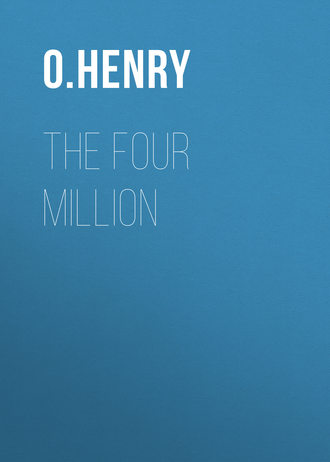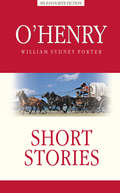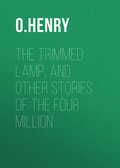
О. Генри
The Four Million
THE CALIPH, CUPID AND THE CLOCK
Prince Michael, of the Electorate of Valleluna, sat on his favourite bench in the park. The coolness of the September night quickened the life in him like a rare, tonic wine. The benches were not filled; for park loungers, with their stagnant blood, are prompt to detect and fly home from the crispness of early autumn. The moon was just clearing the roofs of the range of dwellings that bounded the quadrangle on the east. Children laughed and played about the fine-sprayed fountain. In the shadowed spots fauns and hamadryads wooed, unconscious of the gaze of mortal eyes. A hand organ – Philomel by the grace of our stage carpenter, Fancy – fluted and droned in a side street. Around the enchanted boundaries of the little park street cars spat and mewed and the stilted trains roared like tigers and lions prowling for a place to enter. And above the trees shone the great, round, shining face of an illuminated clock in the tower of an antique public building.
Prince Michael's shoes were wrecked far beyond the skill of the carefullest cobbler. The ragman would have declined any negotiations concerning his clothes. The two weeks' stubble on his face was grey and brown and red and greenish yellow – as if it had been made up from individual contributions from the chorus of a musical comedy. No man existed who had money enough to wear so bad a hat as his.
Prince Michael sat on his favourite bench and smiled. It was a diverting thought to him that he was wealthy enough to buy every one of those close-ranged, bulky, window-lit mansions that faced him, if he chose. He could have matched gold, equipages, jewels, art treasures, estates and acres with any Croesus in this proud city of Manhattan, and scarcely have entered upon the bulk of his holdings. He could have sat at table with reigning sovereigns. The social world, the world of art, the fellowship of the elect, adulation, imitation, the homage of the fairest, honours from the highest, praise from the wisest, flattery, esteem, credit, pleasure, fame – all the honey of life was waiting in the comb in the hive of the world for Prince Michael, of the Electorate of Valleluna, whenever he might choose to take it. But his choice was to sit in rags and dinginess on a bench in a park. For he had tasted of the fruit of the tree of life, and, finding it bitter in his mouth, had stepped out of Eden for a time to seek distraction close to the unarmoured, beating heart of the world.
These thoughts strayed dreamily through the mind of Prince Michael, as he smiled under the stubble of his polychromatic beard. Lounging thus, clad as the poorest of mendicants in the parks, he loved to study humanity. He found in altruism more pleasure than his riches, his station and all the grosser sweets of life had given him. It was his chief solace and satisfaction to alleviate individual distress, to confer favours upon worthy ones who had need of succour, to dazzle unfortunates by unexpected and bewildering gifts of truly royal magnificence, bestowed, however, with wisdom and judiciousness.
And as Prince Michael's eye rested upon the glowing face of the great clock in the tower, his smile, altruistic as it was, became slightly tinged with contempt. Big thoughts were the Prince's; and it was always with a shake of his head that he considered the subjugation of the world to the arbitrary measures of Time. The comings and goings of people in hurry and dread, controlled by the little metal moving hands of a clock, always made him sad.
By and by came a young man in evening clothes and sat upon the third bench from the Prince. For half an hour he smoked cigars with nervous haste, and then he fell to watching the face of the illuminated clock above the trees. His perturbation was evident, and the Prince noted, in sorrow, that its cause was connected, in some manner, with the slowly moving hands of the timepiece.
His Highness arose and went to the young man's bench.
"I beg your pardon for addressing you," he said, "but I perceive that you are disturbed in mind. If it may serve to mitigate the liberty I have taken I will add that I am Prince Michael, heir to the throne of the Electorate of Valleluna. I appear incognito, of course, as you may gather from my appearance. It is a fancy of mine to render aid to others whom I think worthy of it. Perhaps the matter that seems to distress you is one that would more readily yield to our mutual efforts."
The young man looked up brightly at the Prince. Brightly, but the perpendicular line of perplexity between his brows was not smoothed away. He laughed, and even then it did not. But he accepted the momentary diversion.
"Glad to meet you, Prince," he said, good humouredly. "Yes, I'd say you were incog. all right. Thanks for your offer of assistance – but I don't see where your butting-in would help things any. It's a kind of private affair, you know – but thanks all the same."
Prince Michael sat at the young man's side. He was often rebuffed but never offensively. His courteous manner and words forbade that.
"Clocks," said the Prince, "are shackles on the feet of mankind. I have observed you looking persistently at that clock. Its face is that of a tyrant, its numbers are false as those on a lottery ticket; its hands are those of a bunco steerer, who makes an appointment with you to your ruin. Let me entreat you to throw off its humiliating bonds and to cease to order your affairs by that insensate monitor of brass and steel."
"I don't usually," said the young man. "I carry a watch except when I've got my radiant rags on."
"I know human nature as I do the trees and grass," said the Prince, with earnest dignity. "I am a master of philosophy, a graduate in art, and I hold the purse of a Fortunatus. There are few mortal misfortunes that I cannot alleviate or overcome. I have read your countenance, and found in it honesty and nobility as well as distress. I beg of you to accept my advice or aid. Do not belie the intelligence I see in your face by judging from my appearance of my ability to defeat your troubles."
The young man glanced at the clock again and frowned darkly. When his gaze strayed from the glowing horologue of time it rested intently upon a four-story red brick house in the row of dwellings opposite to where he sat. The shades were drawn, and the lights in many rooms shone dimly through them.
"Ten minutes to nine!" exclaimed the young man, with an impatient gesture of despair. He turned his back upon the house and took a rapid step or two in a contrary direction.
"Remain!" commanded Prince Michael, in so potent a voice that the disturbed one wheeled around with a somewhat chagrined laugh.
"I'll give her the ten minutes and then I'm off," he muttered, and then aloud to the Prince: "I'll join you in confounding all clocks, my friend, and throw in women, too."
"Sit down," said the Prince calmly. "I do not accept your addition. Women are the natural enemies of clocks, and, therefore, the allies of those who would seek liberation from these monsters that measure our follies and limit our pleasures. If you will so far confide in me I would ask you to relate to me your story."
The young man threw himself upon the bench with a reckless laugh.
"Your Royal Highness, I will," he said, in tones of mock deference. "Do you see yonder house – the one with three upper windows lighted? Well, at 6 o'clock I stood in that house with the young lady I am – that is, I was – engaged to. I had been doing wrong, my dear Prince – I had been a naughty boy, and she had heard of it. I wanted to be forgiven, of course – we are always wanting women to forgive us, aren't we, Prince?"
"'I want time to think it over,' said she. 'There is one thing certain; I will either fully forgive you, or I will never see your face again. There will be no half-way business. At half-past eight,' she said, 'at exactly half-past eight you may be watching the middle upper window of the top floor. If I decide to forgive I will hang out of that window a white silk scarf. You will know by that that all is as was before, and you may come to me. If you see no scarf you may consider that everything between us is ended forever.' That," concluded the young man bitterly, "is why I have been watching that clock. The time for the signal to appear has passed twenty-three minutes ago. Do you wonder that I am a little disturbed, my Prince of Rags and Whiskers?"
"Let me repeat to you," said Prince Michael, in his even, well-modulated tones, "that women are the natural enemies of clocks. Clocks are an evil, women a blessing. The signal may yet appear."
"Never, on your principality!" exclaimed the young man, hopelessly. "You don't know Marian – of course. She's always on time, to the minute. That was the first thing about her that attracted me. I've got the mitten instead of the scarf. I ought to have known at 8.31 that my goose was cooked. I'll go West on the 11.45 to-night with Jack Milburn. The jig's up. I'll try Jack's ranch awhile and top off with the Klondike and whiskey. Good-night – er – er – Prince."
Prince Michael smiled his enigmatic, gentle, comprehending smile and caught the coat sleeve of the other. The brilliant light in the Prince's eyes was softening to a dreamier, cloudy translucence.
"Wait," he said solemnly, "till the clock strikes. I have wealth and power and knowledge above most men, but when the clock strikes I am afraid. Stay by me until then. This woman shall be yours. You have the word of the hereditary Prince of Valleluna. On the day of your marriage I will give you $100,000 and a palace on the Hudson. But there must be no clocks in that palace – they measure our follies and limit our pleasures. Do you agree to that?"
"Of course," said the young man, cheerfully, "they're a nuisance, anyway – always ticking and striking and getting you late for dinner."
He glanced again at the clock in the tower. The hands stood at three minutes to nine.
"I think," said Prince Michael, "that I will sleep a little. The day has been fatiguing."
He stretched himself upon a bench with the manner of one who had slept thus before.
"You will find me in this park on any evening when the weather is suitable," said the Prince, sleepily. "Come to me when your marriage day is set and I will give you a cheque for the money."
"Thanks, Your Highness," said the young man, seriously. "It doesn't look as if I would need that palace on the Hudson, but I appreciate your offer, just the same."
Prince Michael sank into deep slumber. His battered hat rolled from the bench to the ground. The young man lifted it, placed it over the frowsy face and moved one of the grotesquely relaxed limbs into a more comfortable position. "Poor devil!" he said, as he drew the tattered clothes closer about the Prince's breast.
Sonorous and startling came the stroke of 9 from the clock tower. The young man sighed again, turned his face for one last look at the house of his relinquished hopes – and cried aloud profane words of holy rapture.
From the middle upper window blossomed in the dusk a waving, snowy, fluttering, wonderful, divine emblem of forgiveness and promised joy.
By came a citizen, rotund, comfortable, home-hurrying, unknowing of the delights of waving silken scarfs on the borders of dimly-lit parks.
"Will you oblige me with the time, sir?" asked the young man; and the citizen, shrewdly conjecturing his watch to be safe, dragged it out and announced:
"Twenty-nine and a half minutes past eight, sir."
And then, from habit, he glanced at the clock in the tower, and made further oration.
"By George! that clock's half an hour fast! First time in ten years I've known it to be off. This watch of mine never varies a – "
But the citizen was talking to vacancy. He turned and saw his hearer, a fast receding black shadow, flying in the direction of a house with three lighted upper windows.
And in the morning came along two policemen on their way to the beats they owned. The park was deserted save for one dilapidated figure that sprawled, asleep, on a bench. They stopped and gazed upon it.
"It's Dopy Mike," said one. "He hits the pipe every night. Park bum for twenty years. On his last legs, I guess."
The other policeman stooped and looked at something crumpled and crisp in the hand of the sleeper.
"Gee!" he remarked. "He's doped out a fifty-dollar bill, anyway. Wish I knew the brand of hop that he smokes."
And then "Rap, rap, rap!" went the club of realism against the shoe soles of Prince Michael, of the Electorate of Valleluna.
SISTERS OF THE GOLDEN CIRCLE
The Rubberneck Auto was about ready to start. The merry top-riders had been assigned to their seats by the gentlemanly conductor. The sidewalk was blockaded with sightseers who had gathered to stare at sightseers, justifying the natural law that every creature on earth is preyed upon by some other creature.
The megaphone man raised his instrument of torture; the inside of the great automobile began to thump and throb like the heart of a coffee drinker. The top-riders nervously clung to the seats; the old lady from Valparaiso, Indiana, shrieked to be put ashore. But, before a wheel turns, listen to a brief preamble through the cardiaphone, which shall point out to you an object of interest on life's sightseeing tour.
Swift and comprehensive is the recognition of white man for white man in African wilds; instant and sure is the spiritual greeting between mother and babe; unhesitatingly do master and dog commune across the slight gulf between animal and man; immeasurably quick and sapient are the brief messages between one and one's beloved. But all these instances set forth only slow and groping interchange of sympathy and thought beside one other instance which the Rubberneck coach shall disclose. You shall learn (if you have not learned already) what two beings of all earth's living inhabitants most quickly look into each other's hearts and souls when they meet face to face.
The gong whirred, and the Glaring-at-Gotham car moved majestically upon its instructive tour.
On the highest, rear seat was James Williams, of Cloverdale, Missouri, and his Bride.
Capitalise it, friend typo – that last word – word of words in the epiphany of life and love. The scent of the flowers, the booty of the bee, the primal drip of spring waters, the overture of the lark, the twist of lemon peel on the cocktail of creation – such is the bride. Holy is the wife; revered the mother; galliptious is the summer girl – but the bride is the certified check among the wedding presents that the gods send in when man is married to mortality.
The car glided up the Golden Way. On the bridge of the great cruiser the captain stood, trumpeting the sights of the big city to his passengers. Wide-mouthed and open-eared, they heard the sights of the metropolis thundered forth to their eyes. Confused, delirious with excitement and provincial longings, they tried to make ocular responses to the megaphonic ritual. In the solemn spires of spreading cathedrals they saw the home of the Vanderbilts; in the busy bulk of the Grand Central depot they viewed, wonderingly, the frugal cot of Russell Sage. Bidden to observe the highlands of the Hudson, they gaped, unsuspecting, at the upturned mountains of a new-laid sewer. To many the elevated railroad was the Rialto, on the stations of which uniformed men sat and made chop suey of your tickets. And to this day in the outlying districts many have it that Chuck Connors, with his hand on his heart, leads reform; and that but for the noble municipal efforts of one Parkhurst, a district attorney, the notorious "Bishop" Potter gang would have destroyed law and order from the Bowery to the Harlem River.
But I beg you to observe Mrs. James Williams – Hattie Chalmers that was – once the belle of Cloverdale. Pale-blue is the bride's, if she will; and this colour she had honoured. Willingly had the moss rosebud loaned to her cheeks of its pink – and as for the violet! – her eyes will do very well as they are, thank you. A useless strip of white chaf – oh, no, he was guiding the auto car – of white chiffon – or perhaps it was grenadine or tulle – was tied beneath her chin, pretending to hold her bonnet in place. But you know as well as I do that the hatpins did the work.
And on Mrs. James Williams's face was recorded a little library of the world's best thoughts in three volumes. Volume No. 1 contained the belief that James Williams was about the right sort of thing. Volume No. 2 was an essay on the world, declaring it to be a very excellent place. Volume No. 3 disclosed the belief that in occupying the highest seat in a Rubberneck auto they were travelling the pace that passes all understanding.
James Williams, you would have guessed, was about twenty-four. It will gratify you to know that your estimate was so accurate. He was exactly twenty-three years, eleven months and twenty-nine days old. He was well built, active, strong-jawed, good-natured and rising. He was on his wedding trip.
Dear kind fairy, please cut out those orders for money and 40 H. P. touring cars and fame and a new growth of hair and the presidency of the boat club. Instead of any of them turn backward – oh, turn backward and give us just a teeny-weeny bit of our wedding trip over again. Just an hour, dear fairy, so we can remember how the grass and poplar trees looked, and the bow of those bonnet strings tied beneath her chin – even if it was the hatpins that did the work. Can't do it? Very well; hurry up with that touring car and the oil stock, then.
Just in front of Mrs. James Williams sat a girl in a loose tan jacket and a straw hat adorned with grapes and roses. Only in dreams and milliners' shops do we, alas! gather grapes and roses at one swipe. This girl gazed with large blue eyes, credulous, when the megaphone man roared his doctrine that millionaires were things about which we should be concerned. Between blasts she resorted to Epictetian philosophy in the form of pepsin chewing gum.
At this girl's right hand sat a young man about twenty-four. He was well-built, active, strong-jawed and good-natured. But if his description seems to follow that of James Williams, divest it of anything Cloverdalian. This man belonged to hard streets and sharp corners. He looked keenly about him, seeming to begrudge the asphalt under the feet of those upon whom he looked down from his perch.
While the megaphone barks at a famous hostelry, let me whisper you through the low-tuned cardiaphone to sit tight; for now things are about to happen, and the great city will close over them again as over a scrap of ticker tape floating down from the den of a Broad street bear.
The girl in the tan jacket twisted around to view the pilgrims on the last seat. The other passengers she had absorbed; the seat behind her was her Bluebeard's chamber.
Her eyes met those of Mrs. James Williams. Between two ticks of a watch they exchanged their life's experiences, histories, hopes and fancies. And all, mind you, with the eye, before two men could have decided whether to draw steel or borrow a match.
The bride leaned forward low. She and the girl spoke rapidly together, their tongues moving quickly like those of two serpents – a comparison that is not meant to go further. Two smiles and a dozen nods closed the conference.
And now in the broad, quiet avenue in front of the Rubberneck car a man in dark clothes stood with uplifted hand. From the sidewalk another hurried to join him.
The girl in the fruitful hat quickly seized her companion by the arm and whispered in his ear. That young man exhibited proof of ability to act promptly. Crouching low, he slid over the edge of the car, hung lightly for an instant, and then disappeared. Half a dozen of the top-riders observed his feat, wonderingly, but made no comment, deeming it prudent not to express surprise at what might be the conventional manner of alighting in this bewildering city. The truant passenger dodged a hansom and then floated past, like a leaf on a stream between a furniture van and a florist's delivery wagon.
The girl in the tan jacket turned again, and looked in the eyes of Mrs. James Williams. Then she faced about and sat still while the Rubberneck auto stopped at the flash of the badge under the coat of the plainclothes man.
"What's eatin' you?" demanded the megaphonist, abandoning his professional discourse for pure English.
"Keep her at anchor for a minute," ordered the officer. "There's a man on board we want – a Philadelphia burglar called 'Pinky' McGuire. There he is on the back seat. Look out for the side, Donovan."
Donovan went to the hind wheel and looked up at James Williams.
"Come down, old sport," he said, pleasantly. "We've got you. Back to Sleepytown for yours. It ain't a bad idea, hidin' on a Rubberneck, though. I'll remember that."
Softly through the megaphone came the advice of the conductor:
"Better step off, sir, and explain. The car must proceed on its tour."
James Williams belonged among the level heads. With necessary slowness he picked his way through the passengers down to the steps at the front of the car. His wife followed, but she first turned her eyes and saw the escaped tourist glide from behind the furniture van and slip behind a tree on the edge of the little park, not fifty feet away.
Descended to the ground, James Williams faced his captors with a smile. He was thinking what a good story he would have to tell in Cloverdale about having been mistaken for a burglar. The Rubberneck coach lingered, out of respect for its patrons. What could be a more interesting sight than this?
"My name is James Williams, of Cloverdale, Missouri," he said kindly, so that they would not be too greatly mortified. "I have letters here that will show – "
"You'll come with us, please," announced the plainclothes man. "'Pinky' McGuire's description fits you like flannel washed in hot suds. A detective saw you on the Rubberneck up at Central Park and 'phoned down to take you in. Do your explaining at the station-house."
James Williams's wife – his bride of two weeks – looked him in the face with a strange, soft radiance in her eyes and a flush on her cheeks, looked him in the face and said:
"Go with 'em quietly, 'Pinky,' and maybe it'll be in your favour."
And then as the Glaring-at-Gotham car rolled away she turned and threw a kiss – his wife threw a kiss – at some one high up on the seats of the Rubberneck.
"Your girl gives you good advice, McGuire," said Donovan. "Come on, now."
And then madness descended upon and occupied James Williams. He pushed his hat far upon the back of his head.
"My wife seems to think I am a burglar," he said, recklessly. "I never heard of her being crazy; therefore I must be. And if I'm crazy, they can't do anything to me for killing you two fools in my madness."
Whereupon he resisted arrest so cheerfully and industriously that cops had to be whistled for, and afterwards the reserves, to disperse a few thousand delighted spectators.
At the station-house the desk sergeant asked for his name.
"McDoodle, the Pink, or Pinky the Brute, I forget which," was James Williams's answer. "But you can bet I'm a burglar; don't leave that out. And you might add that it took five of 'em to pluck the Pink. I'd especially like to have that in the records."
In an hour came Mrs. James Williams, with Uncle Thomas, of Madison Avenue, in a respect-compelling motor car and proofs of the hero's innocence – for all the world like the third act of a drama backed by an automobile mfg. co.
After the police had sternly reprimanded James Williams for imitating a copyrighted burglar and given him as honourable a discharge as the department was capable of, Mrs. Williams rearrested him and swept him into an angle of the station-house. James Williams regarded her with one eye. He always said that Donovan closed the other while somebody was holding his good right hand. Never before had he given her a word of reproach or of reproof.
"If you can explain," he began rather stiffly, "why you – "
"Dear," she interrupted, "listen. It was an hour's pain and trial to you. I did it for her – I mean the girl who spoke to me on the coach. I was so happy, Jim – so happy with you that I didn't dare to refuse that happiness to another. Jim, they were married only this morning – those two; and I wanted him to get away. While they were struggling with you I saw him slip from behind his tree and hurry across the park. That's all of it, dear – I had to do it."
Thus does one sister of the plain gold band know another who stands in the enchanted light that shines but once and briefly for each one. By rice and satin bows does mere man become aware of weddings. But bride knoweth bride at the glance of an eye. And between them swiftly passes comfort and meaning in a language that man and widows wot not of.







